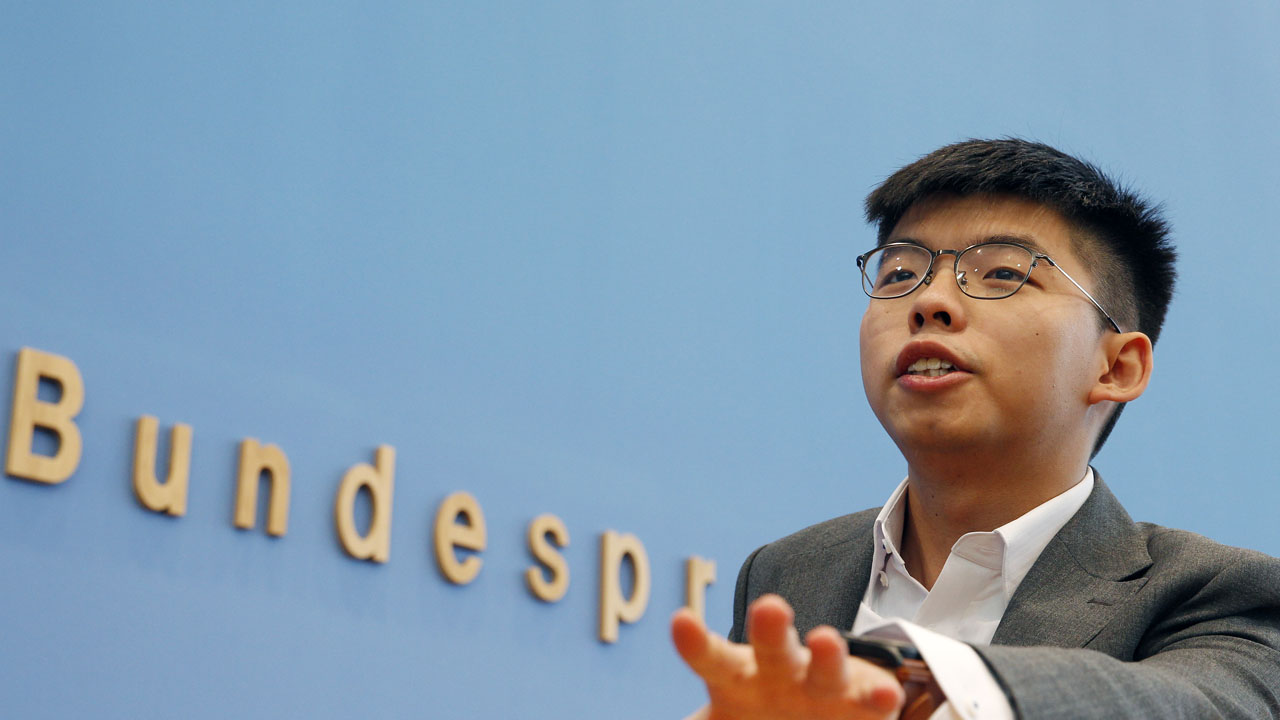
Five years later, the 22-year-old is one of the most prominent faces in the city’s leaderless pro-democracy movement, often seen on rallies, locked up by police and individually called out by the Chinese government.
Scrawny, with gaunt features and a studious frown, Wong has now taken his fight around the globe, recently meeting with politicians in Taiwan, holding talks in Berlin with the German foreign minister, and has speaking engagements scheduled in the United States.
Since Hong Kong’s mass protests began earlier this year, he has been in and out of custody and was among several high-profile activists rounded up in August, a day before the fifth anniversary of Beijing’s rejection of a call for universal suffrage in the city which sparked the 79-day Umbrella Movement.
The arrests were seen as a chilling warning to the current movement.
Activist at 13
Wong spearheaded the Umbrella protests alongside fellow student leaders Nathan Law and Alex Chow, and his speeches and calls for civil disobedience electrified the crowds but the movement failed to win any concessions from China or Hong Kong’s pro-Beijing leaders.
He captured the attention of the world in his casting as David against the Goliath of the Chinese Communist Party, and was hailed as one of the world’s most influential figures by Time, Fortune and Foreign Policy magazines.
He even became the subject of the Netflix documentary “Teenager vs Superpower”, released in 2017.
Born to middle-class Christian parents Grace and Roger Wong, he began his life of activism aged just 13 with a protest against plans for a high-speed rail link between Hong Kong and the mainland.
At the age of just 15, Wong campaigned successfully for Hong Kong to drop a pro-China “National Education” programme, rallying a crowd of 120,000 to blockade the city’s parliament for 10 days.
In many ways, he pioneered a method of demonstration that has since been embraced by Hong Kong’s current protest movement — seizing streets in non-violent civil disobedience — after years of peaceful rallies failed to achieve much.
But he has paid for his activism: prosecutors came after him and many of the Umbrella Movement’s leaders.
‘The city I love’
In May, he was sentenced to two months in prison on a contempt charge after pleading guilty to obstructing the clearance of a major protest camp in 2014.
He was also convicted in a second case related to the storming of a government forecourt during the 2014 protests.
He spent some time behind bars for that case, but in the end, the city’s top court ruled that community service was sufficient punishment.
He went on to found the political party Demosisto, which campaigns for more self-determination for Hong Kong but not independence — a clear red line for Beijing.
Wong’s demands have been both consistent and fairly simple: that Hong Kongers should get to decide their city’s fate, not Communist Party officials in Beijing.
Since the end of the Umbrella Movement, he has been denied entry into Malaysia and Thailand, attacked in the street, and abused by pro-China protesters in Taiwan. But he has said he will fight on.
In an article written for Time from prison in June, he wrote: “My lack of freedom today is a price I knew I would have to pay for the city I love.”
He stepped back into the fray shortly after when authorities released him just one month into his prison term, immediately calling for Hong Kong’s pro-Beijing leader Carrie Lam to step down over her role pushing for the controversial extradition proposal that sparked the current wave of protests.
Authorities did not confirm whether the decision was procedural or a gesture to protestors.
After the bill was eventually scrapped in early September, Wong vowed to fight on, deeming its withdrawal “Too little, too late”.
“Our determination and courage to fight for freedom will still continue,” he said. “Hong Kongers deserve universal suffrage. We deserve to elect our own government.”



